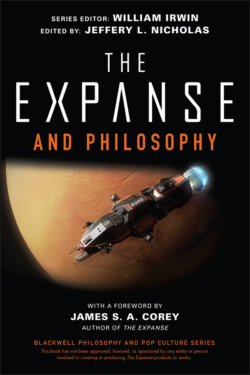Читать книгу The Expanse and Philosophy - Группа авторов - Страница 18
Is It Large Out Here? Or Is It Me?
ОглавлениеPascal’s concerns can be seen as a kind of existential agoraphobia—a crisis of meaning brought on by infinitely wide‐open spaces. In fairness to him, the problem is a deep and serious one—philosophically speaking. Miller, a child of the claustrophobic Ceres, has this agoraphobia written into his bones. It is not abstract, or philosophical, it is a concrete affliction that he feels. Yet, he still is able to overcome it to continue his quest to find the meaning of Julie’s life and her death. This is one reason why he, like Holden, is a quest‐hero in the series.
Miller’s quest really begins when he is fired by Captain Shaddid (“Rock Bottom”). Before that moment he had been doing (in a somewhat shoddy way) his job. He then became intrigued by the mystery of Julie’s disappearance, fell in love with the idea of her, and eventually found the object of his quest. Once he is fired, his decision to follow the investigation is his own. After searching Julie’s apartment, he hangs up his hat—a symbolic removal of the superficial Earth culture he emulates and a return to his authentic Belter self—and he commits to his quest to find the real Julie. Before leaving, he brings Julie’s necklace as a token with him (like a good quest‐hero). Then, the show gives us the irony of a Belter who hates space buying a ticket for a voyage into the infinity outside.
On the transport to Eros, Miller has a conversation with a Mormon missionary who has joined the 100‐year expedition on the ship that Fred Johnson is building for them (soon to be renamed the Behemoth). Miller asks him, “Nobody really knows what’s out there … Doesn’t that scare the shit out of you?” The missionary tells Miller that his faith is what sustains him in the face of the infinite unknown that he will confront on his journey. Miller responds, “You guys are gonna get on this big ship, ride out into the great beyond for 100 years. What happens when you get out there and there’s nothing?” (“Salvage”). Pascal’s confrontation with infinity occurs in his imagination. Miller has to literally step into it.
Miller’s courage in overcoming his fear of space is a good metaphor for the way the characters of The Expanse address their situation in the void. Some sci‐fi treats science as a kind of alchemy that can always be called on to decipher the unknown—problems are solved by mixing together just the right kind of particle and, like the fabled magical art that could turn lead into gold, return all that had been radically changed during the episode back to normal. (I’m looking at you, Star Trek.) The Expanse is different. It does not allow for neatly wrapped‐up solutions. How could it? When the ends of things are hidden in impenetrable secrecy?
Problems in The Expanse are solved by negotiating with the unknown. We see this idea in Holden’s series of negotiations with the mental projection of Miller. Holden is deliberating with an interstellar being that is itself unaware of the meaning of its own purpose, through a proxy that is generated by his own brain. That situation is, to say the least, complicated. Before Miller is liberated from the protomolecule, he is driven by the purpose inscribed in it. Like the Katoa hybrid in the lab on Io who cries out to Jules‐Pierre Mao that he “must finish the work” (“Triple Point”), Miller too feels driven to complete the protomolecule’s work—“the case,” as he calls it. He is focused on the protomolecule’s immediate goal—a goal given to it (and him) by an extinct civilization and situated within an overall plan that he does not know or understand. Holden could be forgiven for thinking that this endeavor is pointless and inconceivable.
However, Holden and the characters of The Expanse, even though they are adrift in the infinity of space, do not give up or lay down and die in the face of a universe in which their lives are so small as to be insignificant. Why do they struggle against injustice? Against an alien threat? Against each other? Where do they find the source of motivation for their actions? Are they simply unaware that their lives and goals are insignificant in the way Pascal understands the universe? It is not simply that they stoically endure this sense of their smallness in the scheme of things. They do something else; they assert themselves. They stand up and demand that they be heard and recognized as dignified. Perhaps Captain Camina Drummer said it best on the bridge of the OPA’s Behemoth as the ship entered the Gate, “We are Belters, nothing in the void is foreign to us. The place we go is the place we belong!” (“Intransigence”).
